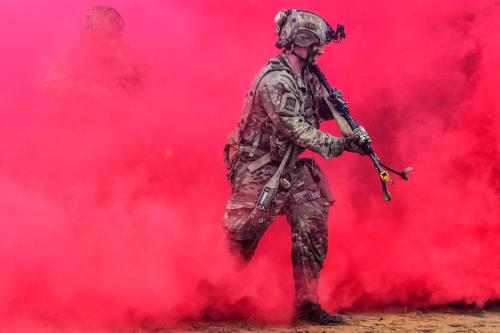The Intermediate-range Nuclear Forces (INF) Treaty marks its 30th anniversary on December 8. That could be one of its last, argues Steven Pifer. This piece originally appeared on The National Interest.
The Intermediate-range Nuclear Forces (INF) Treaty marks its 30th anniversary on December 8. That could be one of its last. Russia has violated the treaty by deploying a prohibited ground-launched cruise missile. Congress has set the Department of Defense on a course to follow suit. Meanwhile, the silence of U.S. allies in Europe and Asia abets the agreement’s demise.
The end of the INF Treaty will make the world less safe. Can the Trump administration and U.S. allies preserve it?
Ronald Reagan and Mikhail Gorbachev signed the INF Treaty in 1987. The accord banned U.S. and Soviet ground-launched ballistic and cruise missiles with ranges between 500 and 5,500 kilometers (300 and 3,300 miles). It resulted in the destruction of some 2,700 missiles and their launchers.
The treaty is now in danger. The Russian military has tested and deployed a ground-launched cruise missile of intermediate range. That violates the treaty’s prohibitions on producing, flight-testing and possessing intermediate-range ground-launched missiles.
Moscow claims the United States has violated the treaty in three ways. Two of the charges appear baseless, but the third may have substance, though it is not as serious as the Russian violation. The launchers for U.S. SM-3 missile interceptors in Romania (and soon in Poland) are very similar to launchers on U.S. Navy warships, which can launch cruise missiles as well as SM-3 interceptors. The Russians thus claim that the launchers in Romania could hold ground-launched cruise missiles, in violation of the treaty.
The Obama administration sought to bring Russia back into compliance, without success. The Trump administration thus far has acted cautiously while it conducts a policy review. Testifying to Congress in September, Chairman of the Joint Chiefs of Staff Dunford said, “We must continue to engage Russia, both directly and together with our allies, to encourage them to return to full and verifiable compliance.” The administration is preparing to take steps that would give Moscow “concrete reasons” to come back into compliance.
Republicans on Capitol Hill have long expressed concern about Russia’s violation and have placed language in the National Defense Authorization Act calling on the Pentagon to establish a program of record to develop its own intermediate-range ground-launched cruise missile. While development does not violate the treaty per se, any flight-test would, as Moscow will almost certainly point out.
As the treaty’s situation has become more precarious, the governments of U.S. allies in Europe and Asia remain silent. No allied leader has publicly challenged Vladimir Putin on the Russian violation, and there are no indications that any have raised it with the Kremlin in private. That is odd, as the Russian missile is designed to target Europe and Asia, not the United States.
The silence of allied leaders sends a damaging message to Moscow. It suggests that they do not care much that Russia violates what they regard as an important arms control agreement. Moreover, if allies do not speak out against the Russian missile, do they expect administration insiders to argue against proceeding with the U.S. missile mandated by Congress?
The treaty’s looming demise will make European and Asian security less stable and less predictable.
Washington thus should try one more push to maintain the agreement and seek to influence Moscow to return to compliance. Pursuing a U.S. intermediate-range ground-launched cruise missile, however, makes little sense. It would cost billions of dollars and take years to field. Moreover, neither NATO nor U.S. allies in Asia would likely agree to deploy it on their territory.
Washington should instead consult with NATO and then deploy already-existing Joint Air-to-Surface Standoff Missiles to Europe and increase the tempo of operations by U.S. warships carrying sea-launched cruise missiles in northern European waters. These actions would give the Kremlin a military incentive to reconsider its course.
In parallel, Washington should press allies to put Russia’s treaty violation at the top of their agendas when engaging the Kremlin’s leadership. Mr. Putin needs to hear that this will be a new problem for Russia’s relations with Europe, Japan and South Korea. (The State Department should as well share information on the violation with China, which likely is also a target of the Russian missile.)
Finally, in the event that Russia responds seriously to U.S. concerns about the Russian violation, the Pentagon should address Moscow’s concerns about the possibility that land-based SM-3 missile interceptor launchers might hold cruise missiles. That could be done without too much difficulty.
These steps might not suffice to save the treaty. Unfortunately, the Kremlin looks like it has made up its mind to bust out of the agreement’s limits regardless. But one last push is worth the effort. Otherwise, the West should reconcile itself to the treaty’s end—and a less secure world.
The Brookings Institution is committed to quality, independence, and impact.
We are supported by a diverse array of funders. In line with our values and policies, each Brookings publication represents the sole views of its author(s).






Commentary
The looming end of the INF Treaty
December 8, 2017